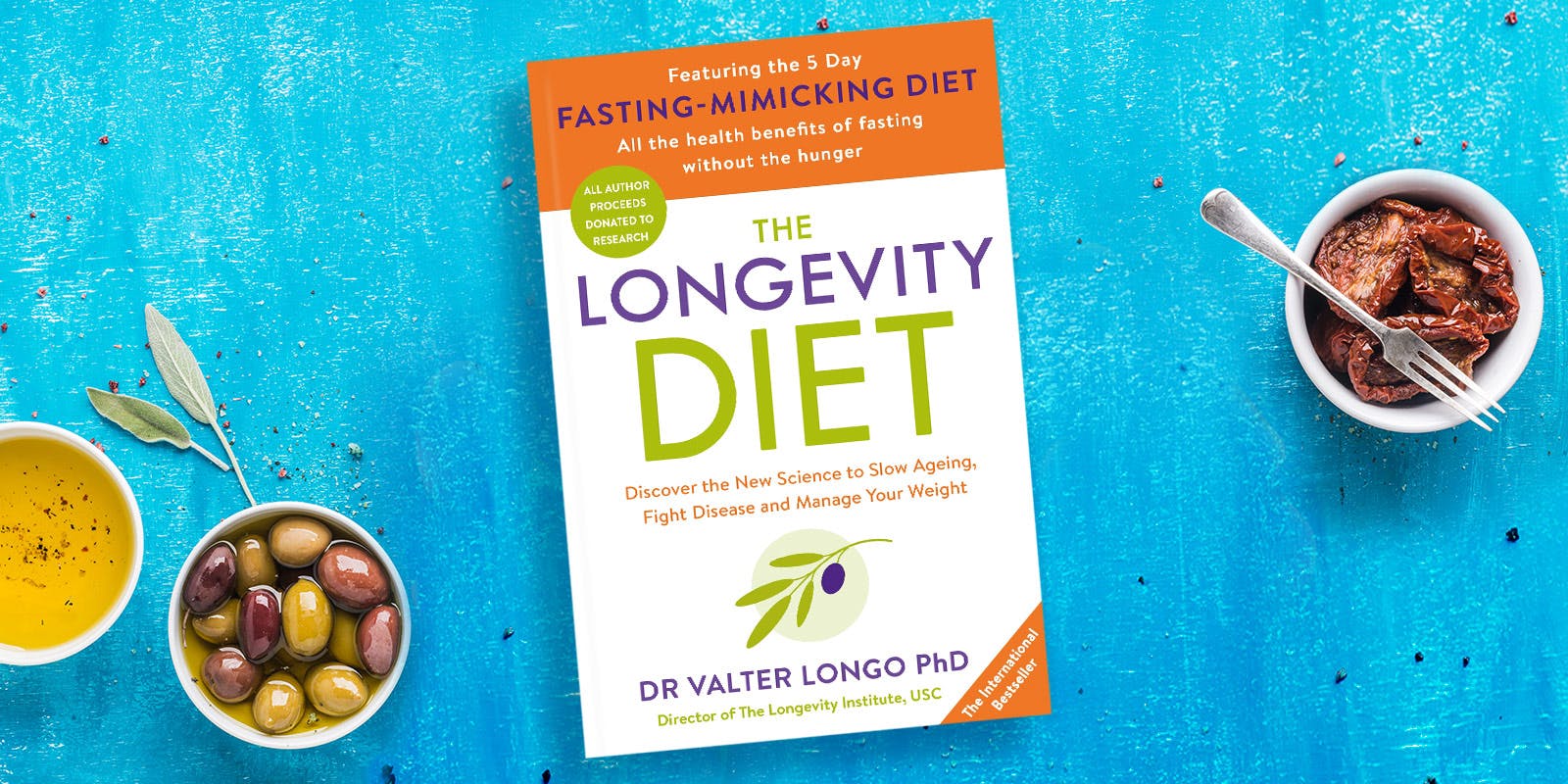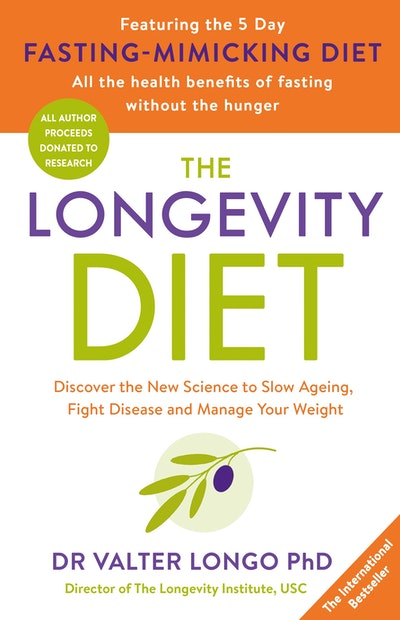Can what you eat determine how long, and how well, you live?
Can what you eat determine how long, and how well, you live? The clinically proven answer is yes, and University of Southern California’s Valter Longo’s Longevity Diet is easier to follow than you’d think. The culmination of 25 years of research on ageing, nutrition, and disease around the globe, this unique combination of an everyday diet and periodic fasting-mimicking diet (FMD) lays out a simple solution to living to a healthy old age through nutrition. In an edited section of his bestselling book, The Longevity Diet, here Longo outlines the fundamentals of eating for a longer life.
We are, most certainly, what we eat
Among the longevity factors within your control, what you eat is the primary choice you can make that will affect whether you live to 60, 80, 100, or 110—and more important, whether you will get there in good health. So when it comes to dietary recommendations, it’s crucial to listen to the right people.
Opinions are dangerous alternatives to the facts
In an Internet-centered world, perhaps the most dangerous development for your health is the chaos generated by the idea that everyone can give dietary advice… Recently a woman asked me what I thought she and her son should eat to stay healthy. After hearing my advice, she responded, ‘I think the best thing to do is to eat everything in moderation.’
I asked her, ‘Would you fly on an airplane that you had personally designed?’
She knew the correct answer to that question was absolutely not. Most planes are designed by teams of world-class engineers working at major aviation companies like Boeing and Airbus, using technology and insights going back to the Wright brothers and even Leonardo da Vinci. Why would you be willing to make key decisions that affect whether you and your loved ones will get cancer, diabetes, cardiovascular disease, and many other illnesses based on the silly idea that one should ‘eat in moderation’? What does that even mean?
The science is in: let’s use it
We needed a better system to filter out the noise and extract beneficial dietary information. This is why I formulated the ‘Five Pillars of Longevity.’ This method is based on my own studies and also on the studies of many other laboratories and clinicians. It uses five research areas to determine whether a nutrient or combination of nutrients is good or bad for health and to identify the ideal combination of foods for optimal longevity.
According to these studies, a precise Longevity Diet accompanied by periodic fasting-mimicking diets can, by regulating the set of ‘longevity genes,’ extend the healthy lifespan… I’m confident in these claims because of the positive results achieved by thousands of people I have studied—either personally or through basic research, clinical trials, and genetic and epidemiological studies.
Decrease your waistline, increase your lifetime
In a longitudinal study of 359,000 European adults followed over ten years, high waist circumference and abdominal fat were associated with increased diabetes, hypertension, high cholesterol, and heart disease. Having a waist circumference of more than 40 inches in men and 35 inches in women doubled the risk of premature death, compared with having a waist circumference of less than 33 inches in men and 27 inches in women. Following the eight points below will allow you to reach and maintain low visceral fat, and a healthy weight and abdominal circumference.
Follow a pescetarian diet
Aim for a diet that is close to 100 percent plant- and fish-based, limiting fish consumption to two or three portions a week and avoiding fish with high mercury content (tuna, swordfish, mackerel, halibut).Consume low but sufficient proteins
Consume 0.68 to 0.79 grams of protein per kilogram of body weight per day. If you weigh 60 kilograms, that comes to about 41 to 47 grams of protein per day, of which 30 grams should be consumed in a single meal to maximize muscle synthesis. The diet should be free of animal proteins (red meat, white meat, cheese) with the exception of proteins from fish, but relatively high in vegetable proteins (legumes, nuts, etc.)Minimize bad fats and sugars; maximize good fats and complex carbs
Every day we hear about ‘low carb versus high carb’ or ‘low fat versus high fat.’ It shouldn’t be a question of either/or, but of which type and how much of each. In fact, your diet should be rich in good unsaturated fats, such as those found in olive oil, salmon, almonds, and walnuts, but as low as possible in saturated, hydrogenated, and trans fats. Likewise, the diet should be rich in complex carbohydrates, such as those provided by whole bread, legumes, and vegetables, but low in sugars and limited in pasta, rice, bread, fruit, and fruit juices.Be nourished
Like an army in need of rations, ammunition, and equipment, the body needs proteins, essential fatty acids (omega-3, omega-6), minerals, vitamins, and, yes, sufficient levels of sugar to fight the many battles raging inside and outside cells. When your intake of certain nutrients becomes too low, the body’s repair, replacement, and defense systems slow down or stop, allowing the damage to accumulate or fungi, bacteria, and viruses to proliferate.1 As extra insurance, take a multivitamin and mineral pill, plus an omega-3 fish oil soft gel every two or three days.Eat a variety of foods from your ancestry
To take in all the required nutrients, you need to eat a wide variety of foods, and it’s best to choose from foods that were common on your parents’, grandparents’, and great-grandparents’ table. The human body is the result of billions of years of evolution, and even the last one thousand years have helped filter out people not fit for a particular environment, or foods not appropriate for a particular genotype (the collection of all genes in a person). Whether it’s lactose or kale, quinoa or turmeric, you have to ask whether these were foods common at the table when you, your parents, or your grand-parents were growing up. If not, it’s best to avoid them or consume them only occasionally.Eat twice a day plus a snack
Unless your waist circumference and body weight are in the normal or low range, it is recommended to eat breakfast and one major meal plus a nourishing low-calorie, low-sugar snack daily. If your weight or muscle mass is too low or if it’s dropping against your will, then eat three meals a day plus a snack.Observe time-restricted eating
Another common practice adopted by many centenarian groups is time-restricted eating, or confining all meals and snacks to within eleven to twelve hours or less a day. Typically you would eat breakfast after 8 a.m. and finish dinner before 8 p.m. You should also not eat within three to four hours of going to sleep.2Practice periodic prolonged fasting
People under age sixty-five who are neither frail nor malnourished and are free of major diseases should undergo two periods of five days a year in which they consume a relatively high-calorie fasting-mimicking diet, or FMD. This diet is rich in complex carbohydrates and healthy fats.
This is an edited section of Valter Longo’s The Longevity Diet. This book is not intended as a substitute for the advice of a medical practitioner. The reader should regularly consult a medical practitioner in matters relating to his/her health and particularly with respect to any symptoms that may require diagnosis or medical attention. Take this information at your own risk. Any weight-loss program should be supervised by a qualified medical practitioner.
- C. Aranow, “Vitamin D and the Immune System,” Journal of investigative medicine: the official publication of the American Federation for Clinical Research (August 2011), 59(6): 881–886; M.J. Rodrigo, M. Iwata, and U.H. von Andrian, “Vitamin Effects on the Immune System: Vitamins A and D Take Centre Stage,” Nature reviews. Immunology (September 2008), 8(9): 685–698; and L. Wardwell, et al, “Nutrient Intake and Immune Function of Elderly Subjects,” Journal of the American Dietetic Association (December 2008), 108(12): 2005–2012.
- K.J. Reid, K.G. Baron, and P.C. Zee, “Meal Timing Influences Daily Caloric Intake in Healthy Adults,” Nutrition research (New York, N.Y.) (November 2014), 34(11): 930–935; K.G. Baron et al, “Contribution of Evening Macronutrient Intake to Total Caloric Intake and Body Mass Index,” Appetite (January 2013), 60(1): 246–251.













